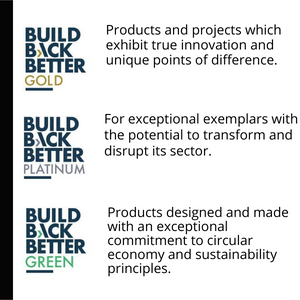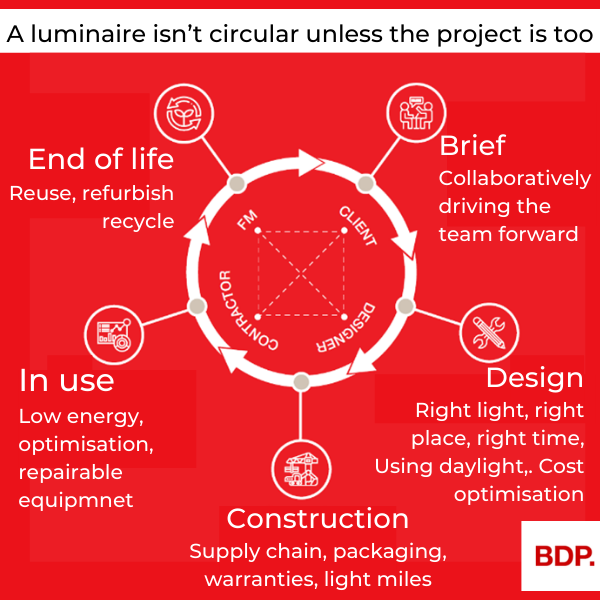The specifier’s role in the circular economy
Summary of Recolight Webinar
On our webinar held on 16 September 2021, we were joined by a panel of incredible lighting professionals, with a passion for sustainability, all doing amazing things reduce our impact on the environment. Specifiers are becoming pivotal in driving the uptake of circular economy principles for new lighting projects, we heard how this is happening.

First up was Ray Molony, Ray is head of content the Build Back Better Awards; an exciting new initiative to champion and celebrate innovation in the built environment.
Ray reminded us that:
- The big development this month is that the Ecodesign and Labelling legislation became enforceable in the EU and effectively in the UK as well.
The regulations were published in 2019 and revised in February and they bring major changes for producers and end-users of lighting products.
Additionally, the Ecodesign regulations contain circular economy requirements on the removability and replaceability of light sources and control gear. - The famous energy label has been rescaled for light sources to a new A to G scale.
- Product designers must also consider new technical requirements for luminaires, including flicker and stroboscopic effects.
Technical Memorandum 66

Technical Memorandum 66 from CIBSE and the Society of Light and Lighting: Creating a circular economy in the Lighting Industry.
We heard from the creators of TM66:
- Bob Bohannon, Head of Academy and Policy at the Lighting Industry Association and formerly President of the Society of Light and Lighting.
- Kristina Allison, Senior Lighting Designer at Atkins UK , Chair of Society of Light & Lighting (SLL) Education Committee.
TM 66 is an algorithm which quantifies how circular a lighting product actually is. It’s clearly key to empowering specifiers to make informed choices and choose fittings that have robust circularity credentials. It’s worth noting that Bob and Kristina worked on TM66 as a voluntary project!
A luminaire isn’t circular unless the project is too
 Mark Ridler, Head of Lighting at BDP, shared how BDP are moving towards a Reuse, Reduce, Avoid model with a superbly titled presentation “A luminaire isn’t circular unless the project is too” Key takeaways from Mark’s presentation:
Mark Ridler, Head of Lighting at BDP, shared how BDP are moving towards a Reuse, Reduce, Avoid model with a superbly titled presentation “A luminaire isn’t circular unless the project is too” Key takeaways from Mark’s presentation:
- Getting the whole supply chain involved; architects, interior designers, landscape architects, helps to energise the client and drive change.
- Use natural daylight as much as possible to reduce the number of fittings needed in lighting design schemes. In business spaces, use light in the place at the right time. No point lighting areas where no-one actually works, or at times when nobody works. Light only where light is needed.
- Brightness comes through contrast, lower light in common areas in contrast to those areas you want to be bright.
- Circular economy is necessarily collaborative – designers alone will have limited impact.
Mark concluded that a project needs governance through it’s life cycle and innovation in the supply chain; although standards are not yet available.

The Green Lighting Alliance
Sophie O’Rourke, Lighting Designer at Nulty+ and Founding Member of the Green Light Alliance, introduced us to the GLA: an alliance of suppliers, specifiers, and educators.
Their objective is to help everyone in the lighting sector understand their role in adopting and promoting the circular economy. They work towards industry standards that are universally recognised, trusted and sought-after. Also providing an invaluable hub for discussion and education in circular lighting design & the circular economy.
And most incredibly, the GLA are independent, voluntary, and growing in numbers.
 Lighting Design Studio: Working on the front line of the Circular Economy
Lighting Design Studio: Working on the front line of the Circular Economy
Bruce Weil, Co-owner of Lighting Design Studio told us that:
“the retail lighting sector especially needed to reconsider its lighting practices. He described it as a real outlier, wedded to extremely high illuminance levels and energy use. He added that offsetting the carbon in projects showed that retail projects are “a real standout.”
He noted that as the climate crisis evolves, the role of lighting designers will potentially become even more critical but are still lacking any kind of standardised approach.
Panel discussion with Q & A
A few comments from our panel in response to questions from attendees. To hear more, listen to the replay!

- Specifiers have a crucial role to play in educating end users about the importance of using products which embody CE principles, whether they are second hand or brand new.
- Legislation is a big driver, specifiers and end users are driving towards this model too.
- A need to encourage more specifiers to promote re-use, re-used and remanufactured products.
- Manufacturers have the opportunity to respond positively and help drive change in the industry.
- Carbon neutral/ carbon zero are on more companies’ agendas than ever before.
- Resource depletion and bio-diversity not currently a key concern. Resource depletion will start to drive up cost of raw material. We will have to use more recycled material.
- Recycling is not always the best solution, reducing the amount used is more important; facilitation and encouraging reuse.
- Suggestion that warranties of refurbished stock should look at the used car model, with the those refurbishing the product to provide a certification.
- Regulation will be important in moving to a general place where CE principles are used as standard. Also education throughout the industry will help decision makers make the right decision.
- A scoring system, similar to the EURO NCAP system for cars, would help sales of products manufactured under CE principle. Who wants a 2 star rated product when you can easily find a 4/5 star version?
In conclusion
“The lighting industry needs a systemic change if it is to fully adopt circular principles and practices.”
Ray Molony
LINKS
Watch the replay and download slides > Recolight Event page
Read the press release: ‘Systemic change’ needed in lighting industry to adopt circular economy principles

